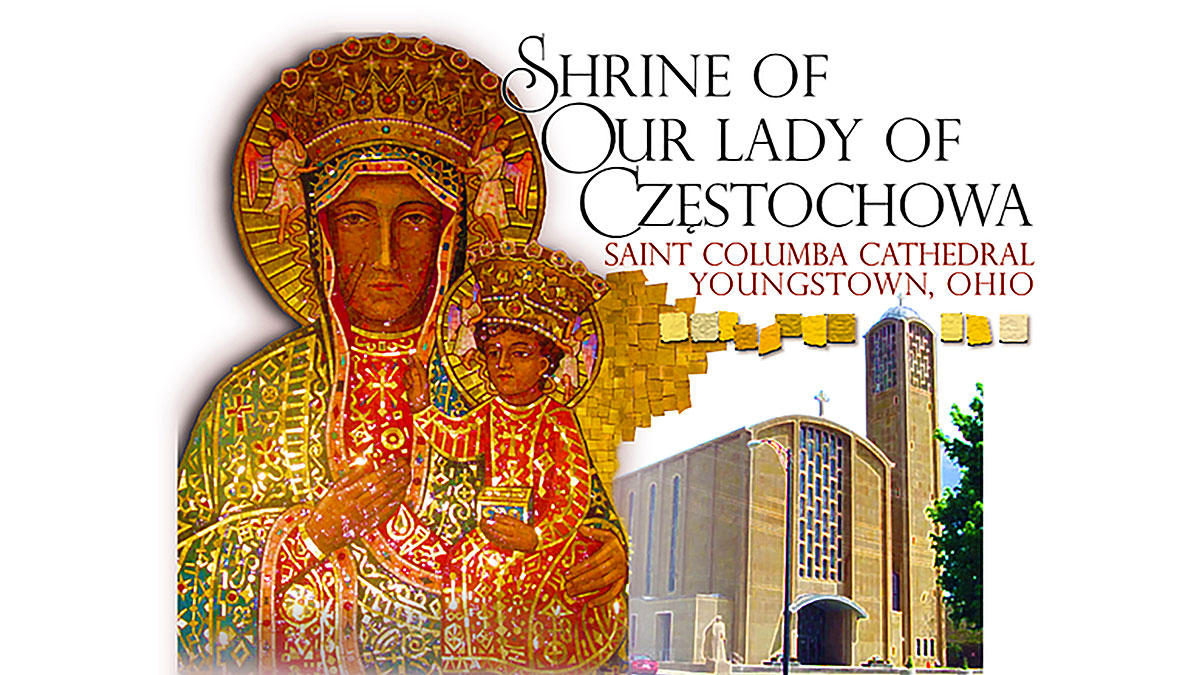- Home >
- POLISH AMERICANS NEWS >
- > Ohio
Polish Youngstown, Cathedral Hosts Feast Day Mass in Honor of Our Lady of Częstochowa
Aundréa Cika Heschmeyer August 10, 2023

Polish Youngstown and St. Columba Cathedral are excited to honor the feast day of Eastern Europe's most beloved Marion icons with a special event on Saturday, August 26, 2023, at 4 PM at St. Columba Cathedral, 159 W Rayen Ave, Youngstown, OH 44503—very Rev. Msgr. Robert J. Siffrin will serve as celebrant, with other Diocesan Slavic priests invited. Traditional Polish hymns will be part of the English language mass. A Polish meal will be done in the Cathedral hall afterward. A free-will offering of $15 pp is requested. Accordionist Luke Politsky will provide music. The public is invited.
The Reverend Eric Orzech, Past President and Board Member of the Polish-American Priests Association, will be the keynote speaker. He will speak to the miracles associated with the ”Black Madonna” and her role in Catholic lives today. He is the pastor of the Shrine Church of St. Stanislaus in Cleveland’s Slavic Village and the miracle church of St. Casimir Church in Cleveland.
The icon of Our Lady of Częstochowa has been intimately associated with Poland for more than 600 years. In every Polish church, there is a reproduction of the Black Madonna. When Poles emigrated, they brought their devotion to the Mother of God, creating home altars and innumerable churches, chapels, and shrines in her honor. A special place is always reserved for her.
Diocese of Youngstown Shrine to Our Lady of Częstochowa
In 2010, the Most Reverend George V. Murry, S.J, enlisted PolishYoungstown’s help to initiate an effort with the parish of St. Columba Cathedral to renovate the baptistery into a shrine to Our Lady of Częstochowa. This was done to welcome the parishioners of St. Casimir and St. Stanislaus
into the cathedral parish upon the closure of their reorganized churches. Financial campaigns and contributions raised from PolishYoungstown, the St. Casimir Society, and Cathedral parishioners made this effort a reality.
.jpg)
The parishioners of St. Stanislaus Kostka graciously bestowed their incredible mosaic icons to serve as the centerpiece of the shrine. It serves as an enduring symbol of the sacred mission of Our Lady as protector of Poland and her people everywhere.
The Shrine was dedicated on October 30, 2012, with guests from around the region and capped off with a performance by Śląsk Song and Dance Ensemble of Poland. It is open to the public, offers prayer cards and recordings, and is available for devotion whenever the Cathedral is open.
Please consider joining us to support the maintenance and improvement of Her home at the Cathedral of St. Columba. Your generous, tax-deductible gift offers the opportunity for you and your loved ones to share in the perpetual care of Our Lady. This membership will ensure there is a place in our Cathedral Church where all of Polonia has a home and where the faithful from throughout the Mahoning Valley have a place to give honor and devotion to the Mother of God. For more information, call 330-744-5233.
Background on Our Lady of Częstochowa
“You'll find quiet in her arms and you'll find shelter from the evil, 'cause she has a tender heart for all of her children.” – lyrics from the song “Czarna Madonna”
In every Polish church there is a reproduction of the Black Madonna. When Poles emigrated to America, they brought their devotion to the Mother of God with them, creating home altars and innumerable churches, chapels, and shrines in her honor. A special place is always reserved for her.
The beloved, miraculous icon of Our Lady of Częstochowa is housed in the Monastery of Jasna Góra in Częstochowa, Poland. It is the national shrine of Poland and, combined, they are the center of Polish Catholicism.
According to tradition, the icon was painted by Luke the Evangelist on a tabletop built by Jesus himself and arrived in Poland in 1382 with a Polish army fleeing the Tartars.
It is said that the presence of the holy painting saved its church from being destroyed in a fire, but not before the flames darkened the flesh-tone pigments. The two scars on the right cheek are said to have been inflicted when the Hussites stormed the monastery in 1430, stealing the icon. After putting it in their wagon, the thieves tried to get away, but their horses refused to move. They threw the portrait down to the ground, and one of the plunderers drew his sword upon the image and inflicted two deep strikes. When the robber tried to impose a third strike, he fell to the ground and squirmed in agony until his death.
There are numerous miracles for which the Black Madonna is credited. The most famous occurred in 1655, when Swedish troops were about to invade Częstochowa. Polish soldiers prayed fervently before the icon for deliverance, and the enemy retreated. In 1656, King John Casimir declared Our Lady of Częstochowa "Queen of Poland" and made the city the spiritual capital of the nation.
During Nazi occupation, Hilter prohibited pilgrimages to Jasna Góra, but many still secretly made the annual journey. During the Cold War, Jasna Góra was a center of anti-Communist resistance.
Today, it is the third-largest Catholic pilgrimage site in the world; it is considered the national shrine of Poland and the spiritual capital of the nation.
SPONSORED ARTICLE
For the most up-to-date information, please contact the company directly.The photos contained in the article serve only as an illustration of the article.
BUSINESS ONLINE CATALOG
